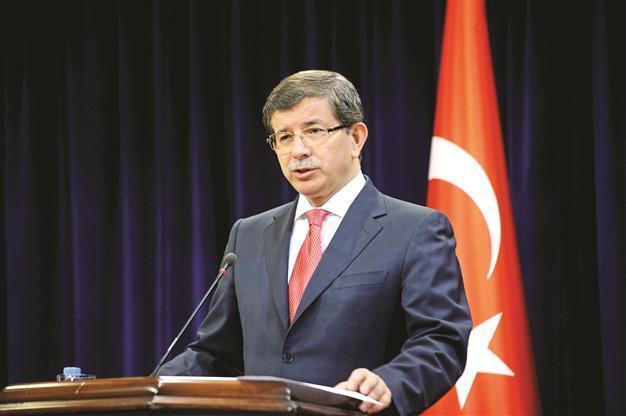Turkey ‘ready to share pain’ with Armenians
ANKARA

Davutoğlu’s remarks come after France’s Constitutional Council struck down a bill criminalizing ‘genocide’ denials. DAILY NEWS photo
Turkey is ready to share the pain of Armenians as they prepare to mark the 100th anniversary of the 1915 killings, Turkish Foreign Minister Ahmet Davutoğlu has said following a French court’s rejection of a “genocide” denial bill.“We want to share the pain of those who are ready to share it with us,” Davutoğlu was quoted as saying by Anatolia news agency in an interview with state-run television TRT Haber late Feb. 28, Agence France-Presse reported.
Armenians claim up to 1.5 million of their forebears were killed in a 1915-16 events while Turkey says 500,000 died and ascribes the toll to fighting and starvation during World War I.
“It is necessary to keep channels open in order to share history,” said Davutoğlu.
Davutoğlu’s remarks came after France’s Constitutional Council struck down a government-backed law criminalizing denials of the 1915 events as genocide on the grounds that it contradicts the French constitution and violated freedom of expression; the council’s rejection was quickly welcomed by Turkey.
Historical problems between Turkey and Armenia can be solved between the two states, President Abdullah Gül told reports yesterday following the council’s decision.
“If third countries intervene into this issue, it will be a mistake; it will not help,” he said, adding that the problem would only become deadlocked otherwise. Gül also reiterated Turkey’s proposal for a joint history commission to investigate the 1915 incidents.
Turkey hails French court’s decision
Parliamentary Speaker Cemil Çiçek said yesterday that the Constitutional Council had given a clear message that history should not be written by parliaments.
“The decision of the council, which is based on the grounds of law, is compatible with France’s tradition of democracy and experience as a state with the rule of law,” Çiçek said in a statement. “Our expectation is for France to contribute to a solution of the historical problem between Turkey and Armenia through dialogue.”
Deputy Prime Minister Bülent Arınç said via his Twitter account late Feb. 28 that the Constitutional Council had given a legal lesson to the French politicians who had backed the “freakish” legislation.
Turkey’s EU minister, Egemen Bağış, said France had averted a “historical mistake,” while Davutoğlu called the decision “an important step that will legally avert future exploitations.”
Rıfat Hisarcıklıoğlu, the chairman of the Turkish Union of Chambers and Exchange Commodities (TOBB), a business organization that lobbied in France against the denial law, also said the council had averted a historical mistake. In a written statement released yesterday, Hisarcıklıoğlu thanked the French businessman who “stood by Turkey.”
Turkey and Armenia have no diplomatic relations as Ankara closed its border with Yerevan in 1993 because of its war with Azerbaijan over the disputed region of Nagorno-Karabakh.
In 2009, Turkish and Armenian foreign ministers signed protocols to establish diplomatic ties and reopen their shared border. The protocols also called for a joint commission to examine the two countries’ shared history. The normalization process, however, stalled after Turkey faced a backlash from its traditional ally, Azerbaijan, and opposition at home.
French presidential bid joins ‘genocide’ bill row
ANKARAi
French President Nicolas Sarkozy’s Union for a Popular Movement party said yesterday a new bill to punish denial of the Armenian genocide allegations would not be put forward before June after a top court struck down a previous draft.
“The problem is that unfortunately Parliament’s work has finished and we can’t put this bill on the agenda,” party leader François Cope told journalists after Sarkozy vowed to draw up a new draft. “We will have to wait for the next Parliament,” after elections in June, Cope said.
France’s Constitutional Council ruled Feb. 28 that the bill to punish denial of the 1915 Armenian genocide claims was unconstitutional as it infringed on the right to freedom of expression. Sarkozy is facing a tough re-election battle in a two-round April-May presidential vote ahead of June’s parliamentary polls.
His rival, French presidential frontrunner François Hollande, has also promised to bring back the “genocide” law if he is elected, Anatolia news agency reported.
Hollande promised to reopen the debate in a peaceful negotiation process if he becomes the next president.
“It is impossible to prepare a new draft due to the approaching end of the legal year,” Hollande said. “But I will bring it up again and try to live up to my promises.”
After the bill was annulled by the Constitutional Council, the lawmaker of Sarkozy’s UMP party who had proposed the bill, Valerie Boyer, said she was “sad but determined.”
“Today under French law there are two types of victims and two types of descendants of victims... Some are protected from revisionist acts and some are not, and I think this is a serious double standard.”
Also, Sarkozy’s office quickly put out a statement saying the president noted “the great disappointment and profound sadness of all those who welcomed with hope and gratitude the adoption of this law aimed at providing protection against revisionism.”
Compiled from AFP and AA stories by the Daily News staff.
















